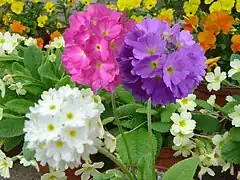| Primula denticulata | |
|---|---|
 | |
| Scientific classification | |
| Kingdom: | Plantae |
| Clade: | Tracheophytes |
| Clade: | Angiosperms |
| Clade: | Eudicots |
| Clade: | Asterids |
| Order: | Ericales |
| Family: | Primulaceae |
| Genus: | Primula |
| Species: | P. denticulata |
| Binomial name | |
| Primula denticulata | |
Primula denticulata, the drumstick primula, is a species of flowering plant in the family Primulaceae, native to moist alpine regions of China (S Xizang), Afghanistan, Bhutan, India, N Myanmar, Nepal, and Pakistan.[1] It is an herbaceous perennial growing to 45 cm (18 in) tall and wide, with rosettes of oval leaves and sturdy stems bearing spherical umbels of purple flowers in late spring and early summer.[2] Flowers can also be lavender, pink, or white in colour.[3] The specific epithet denticulata means "small-toothed", referring to the serrated leaf edges.[4] The plant's common name, drumstick primula, refers to the spherical shape of the inflorescence, above an erect stem.[3]
A popular garden subject for deep moist soil in sun or partial shade, P. denticulata and its cultivars can be grown from seed.[5] It has gained the Royal Horticultural Society's Award of Garden Merit.[6][7]
Toxicity
Primula denticulata is known to contain the contact allergens primin and other quinoid compounds.[8]
.jpg.webp)
 Colour forms
Colour forms
References
- ↑ "Primula denticulata". Flora of China. Retrieved 1 May 2018.
- ↑ RHS A-Z encyclopedia of garden plants. United Kingdom: Dorling Kindersley. 2008. p. 1136. ISBN 978-1405332965.
- 1 2 "Primula denticulata 'Ronsdorf' - Plant Finder". www.missouribotanicalgarden.org. Retrieved 2021-12-16.
- ↑ Harrison, Lorraine (2012). RHS Latin for gardeners. United Kingdom: Mitchell Beazley. p. 224. ISBN 9781845337315.
- ↑ Buchan, Ursula (21 May 2005). "How to grow: Primula denticulata". Telegraph. Retrieved 28 May 2013.
- ↑ "RHS Plant Selector - Primula denticulata". Retrieved 23 February 2020.
- ↑ "AGM Plants - Ornamental" (PDF). Royal Horticultural Society. July 2017. p. 81. Retrieved 14 May 2018.
- ↑ "Primula denticulata". Plants of the World Online. Kew Science. Retrieved 14 November 2019.